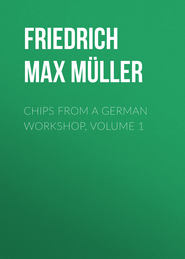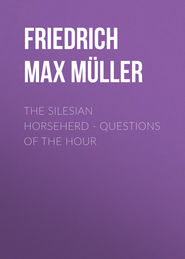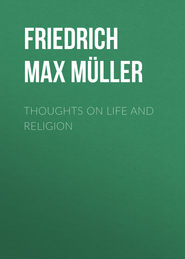По всем вопросам обращайтесь на: info@litportal.ru
(©) 2003-2024.
✖
Memories: A Story of German Love
Настройки чтения
Размер шрифта
Высота строк
Поля
"'We pray: 'Thy will my Lord and God be done,'
And lo, He has no will! He is an eternal silence.'"
She listened to me quietly, and, after a moment's reflection, said: "Health and strength belong to your faith; but there are life-weary souls, who long for rest and sleep, and feel so lonely that when they fall asleep in God, they miss the world as little as the world misses them. It is a foretaste of divine rest to them when they can wrap themselves in the divine; and this they can do, since no tie binds them fast to earth, and no wish troubles their hearts except the wish for rest.
"'Rest is the highest good, and were God not rest,
Then would I avert my gaze even from Him.'
"You do the German theologian an injustice. It is true he teaches the nothingness of the external life, but he does not wish to see it annihilated. Read me the twenty-eighth chapter."
I took the book and read, while she closed her eyes and listened:
["Und wa die voreinunge geschicht in der wahrheit und wesentlich wirt, da stet vorbass der inner mensche in der einung unbeweglich und got lest den ussern menschen her und dar bewegt werden von diesem zu dem. Das muss und sol sin und geschehen, dass der usser mensche spricht und es ouch in der warheit also ist, 'ich wil weder sin noch nit sin, weder leben oder sterben, wissen oder nicht wissen, tun oder lassen, und alles das disem glich ist, sunder alles, das da muss und sol sin und geschehen, da bin ich bereit und gehorsam zu, es si in lidender wise oder in tuender wise.' Und alsoe hat der usser mensch kein warumbe oder gesuch, sunder alleine dem ewigen willen genuk zu sin. Wan das wirt bekannt in der warheit, das der inner mensche sten sol unbeweglich und der usser mensch muss und sol bewegt werden, und hat der inner mensch in siner beweglikeit ein warumb, das ist anders nichts dann ein muss- und sol-sin, geordnet von dem ewigen willen. Und wa got selber der mensch were oder ist, da ist es also. Das merket man wol in Kristo. Auch wa das in goetlichem und us goetlichem liechte ist, da ist nit geistliche hochfart noch unachtsame friheit oder frie gemute, sunder ein gruntlose demutigkeit und ein nider geschlagen und ein gesunken betrubet gemut, und alle ordenligkeit und redeligkeit, glichheit und warheit, fride und genugsamkeit, und alles das, das allen tugenden zu gehoert, das muss da sin. Wa es anders ist, da ist im nit recht, als vor gesprochen ist. Wan recht als dises oder das zu diser einung nit gehelfen oder gedienen kan, also is ouch nichtes, das es geirren oder gehindern mag, denn alleine der mensch mit sinem eigen willen, der tut im disen grossen schaden. Das sol man wissen."]
"And when the union takes place in truth and becomes real, then the inner man stands henceforth immovable in the union, and God permits the outer man to be driven hither and thither from this to that. It must and shall be and happen, that the outer man says—and is so also in truth—'I will neither be nor not be, neither live nor die, neither know nor not know, neither do nor leave undone—and everything which is similar to this, but I am ready and obedient to do everything, which must and shall be done, be it passively or actively.' And thus has the outer man no question or desire, but to, satisfy only the Eternal Will. When this will be known in truth, that the inner man shall stand, immovable, and that the outer man shall and must be moved,—the inner man has a why and wherefore of his moving, which is nothing but an 'it must and shall be' ordered by the Eternal Will. And if God himself were or is the man, it would be so. This is well seen in Christ. And what in the Divine Light is and from the Divine Light, has neither spiritual pride nor careless license nor an independent spirit—but a great humility, and a broken and contrite heart,—and all propriety and honesty, justice and truth, peace and happiness,—all that belongs to all virtues, it must have. When it is otherwise, then he is not happy, as has been said. When this does not help to this union, then there is nothing which may hinder it but man alone with his own will, which does him such great harm. That, one ought to know."
"This is sufficient," said she; "I believe we understand each other now. In another place, our unknown friend says still more unmistakably that no man is passive before death, and that the glorified man is like the hand of God, which does nothing of itself except as God wills; or, like a house in which God dwells. A God-possessed man feels this perfectly, but does not speak of it. He treasures his life in God like a love secret. It often seems to me like that silver poplar before my window. It is perfectly still at evening, and not a leaf trembles or stirs. When the morning breeze rustles and tosses every leaf, the trunk with its branches stands still and immovable, and when autumn conies, though every leaf which once rustled falls to the ground and withers, the trunk waits for a new spring."
She had lived so deep a life in her world that I did not wish to disturb it. I had but just released myself with difficulty from the magic circle of these thoughts, and scarcely knew whether she had not chosen the better part which could not be taken away from her; while we have so much trouble and care.
Thus every evening brought its new conversation, and with each evening, some new phase of her fathomless mind disclosed itself. She kept no secret from me. Her talk was only thinking and feeling aloud, and what she said must have dwelt with her many long years, for she poured out her thoughts as freely as a child that picks its lap full of flowers and then sprinkles them upon the grass. I could not disclose my soul to her as freely as she did to me, and this oppressed and pained me. Yet how few can, with those continual deceptions imposed upon us by society, called manners, politeness, consideration, prudence, and worldly wisdom, which make our entire life a masquerade! How few, even when they would, can regain the complete truth of their existence! Love itself dares not speak its own language and maintain its own silence, but must learn the set phrases of the poet and idealize, sigh and flirt instead of freely greeting, beholding and surrendering itself, I would most gladly have confessed and said to her: "You know me not," but I found that the words were not wholly true. Before I left, I gave her a volume of Arnold's poems, which I had had a short time, and begged her to read the one called "The Buried Life." It was my confession, and then I kneeled at her couch and said "Good Night." "Good Night," said she, and laid her hand upon my head, and again her touch thrilled through, every limb and the dreams of childhood uprose in my soul. I could not go, but gazed into her deep unfathomable eyes until the peace of her soul completely overshadowed mine. Then I arose and went home in silence—and in the night I dreamed of the silver poplar around which the wind roared—but not a leaf stirred on its branches.
THE BURIED LIFE
Light flows our war of mocking words, and yet
Behold, with tears my eyes are wet;
I feel a nameless sadness o'er me roll.
Yes, yes, we know that we can jest;
We know, we know that we can smile;
But there's a something in this breast
To which thy light words bring no rest,
And thy gay smiles no anodyne.
Give me thy hand, and hush awhile,
And turn those limpid eyes on mine,
And, let me read there, love, thy inmost soul.
Alas, is even love too weak
To unlock the heart, and let it speak?
Are even lovers powerless to reveal
To one another what indeed they feel?
I knew the mass of men concealed
Their thoughts, for fear that if revealed
They would by other men be met
With blank indifference, or with blame reproved;
I knew they lived and moved,
Tricked in disguises, alien to the rest
Of men and alien to themselves—and yet,
The same heart beats in every human breast.
But we, my love—does a like spell benumb
Our hearts—our voices?—must we too be dumb?
Ah! well for us, if even we,
Even for a moment, can yet free
Our hearts and have our lips unchained;
For that which seals them hath been deep ordained.
Fate which foresaw
How frivolous a baby man would be,
By what distractions he would be possessed,
How he would pour himself in every strife,
And well-nigh change his own identity,
That it might keep from his capricious play
His genuine self, and force him to obey,
Even in his own despite, his being's law,
Bade through the deep recesses of our breast
The unregarded River of our Life,
Pursue with indiscernible flow its way;
And that we should not see
The buried stream, and seem to be
Eddying about in blind uncertainty,
Though driving on with it eternally.
But often, in the world's most crowded streets,
But often in the din of strife,
There rises an unspeakable desire
After the knowledge of our buried life;
A thirst to spend our fire and restless force
In tracking out our true original course;
A longing to inquire
Into the mystery of this heart that beats
So wild, so deep, in us; to know
Whence our thoughts come, and where they go.
And many a man in his own breast then delves,
But deep enough, alas, none ever mines;
And we have been on many thousand lines,
And we have shown on each, talent and power,
But hardly have we, for one little hour,
Been on our own line, have we been ourselves;
Hardly had skill to utter one of all
The nameless feelings that course through our breast,
But they course on forever unexpressed.
And long we try in vain to speak and act
Our hidden self, and what we say and do
Is eloquent, is well—but 'tis not true.
And then we will no more be racked








